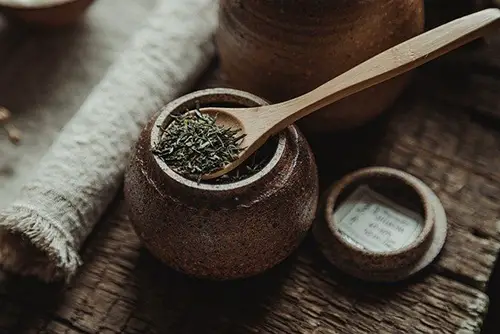
If you have been wondering about does tea deplete magnesium, the answer is no, it doesn’t!
As individuals who drink tea every day, we had heard the rumors about tea disrupting the absorption of minerals such as magnesium. However, we have also come from long lines of ancestors who have also enjoyed this beverage and we doubted these claims as there appeared to be no reported side effects.
Still, we decided to go ahead and do the research, looking up any medical journals that we could find. If you want to take a closer look at the interaction between tea and various minerals and supplements, check out this information below!
Contents
There was a long held belief that the tannins in tea prevented the absorption of certain minerals like magnesium. The evidence proves that this isn't the case, though. In fact, tea doesn’t appear to have any kind of impact on magnesium.
If you are experiencing lower magnesium levels or symptoms associated with magnesium depletion, then there is likely another cause.
That being said, you should be careful about where your tea leaves are sourced from. This is because there are many tea bags on the market that do contain lead. Now, you may be trying to figure out what lead has to do with magnesium?

Well, there is some evidence that a greater lead consumption could impede magnesium absorption. Due to this, it is a good idea to always research how and where your teas are grown and sourced. To stay on the safe side, it is best to buy organic teas to guarantee no lead is entering your cup or your body.
Since many brands have been tested for lead levels, it is a good idea to read reports about popular brands. This will give you a better idea of which teas you should be staying clear from.
You should know that some people are more prone to magnesium depletion than others. This includes people with gastrointestinal diseases, alcohol dependence, type 2 diabetes, and older adults. In turn, with time, this could lead to a magnesium deficiency.
If you fall into this category, it is a good idea to speak to a doctor about your tea consumption. Under such circumstances, your healthcare provider may want to alter your diet in specific ways to ensure that the magnesium depletion doesn’t worsen.
There is also the possibility that other supplements, foods, or even exposure to certain elements may compromise magnesium absorption. Once again, it is only by speaking with your doctor and running the appropriate tests that you will be able to be certain about this.
So, how do you know that you may be low on magnesium? Well, you may experience the following symptoms:
Remember that you can’t diagnose yourself based on these symptoms alone. After all, there are a variety of issues and conditions that can cause such reactions. If you do feel like you are low on magnesium, it is important to speak with a doctor.
A clinician will be able to run various tests to discover if your magnesium levels are actually low. In turn, they may also be able to discover why this is.

If your body is having a hard time absorbing magnesium, then you may be recommended supplements. If this isn't the case, though, your doctor may simply ask you to eat foods that have higher concentrations of magnesium. These include almonds, pumpkin seeds, dark chocolate, peanuts, popcorn, flaxseeds, sunflower seeds, chia seeds, cocoa, coffee, cashews, hazelnuts, and oats.
It can be tempting to just take supplements instead of adding these foods to your diet. However, you should be aware that there is a risk involved here. It is just as easy for you to consume too much magnesium as most supplements are available in concentrated doses.
In milder instances, you can experience gastrointestinal and abdominal issues. However, with magnesium toxicity, it can progress to muscle weakness, difficulty breathing, and even cardiac arrest. While this is unlikely, you should definitely keep track of how much magnesium you are taking.
In general, though, it is a good idea to balance out your tea consumption. While tea has numerous benefits, there is still a limit to how much you should drink every day. Most experts would advise you to stick to 3 to 5 cups a day.
Bear in mind that some people may be a bit more sensitive to tea and its elements than others. If you fall into this category, you may want to cut back to around 1 to 2 cups a day. You can also try experimenting with various teas to find out which one serves you best.
Related Articles
Black Tea - What You Need to Know About the Global Superstar
Green Tea: The Whole Story Behind the Superfood
Of course, you shouldn’t reduce your consumption immediately as this can cause a caffeine withdrawal. Instead, cut down on how much you degree little by little. This way, your body won’t react negatively to the process.
To wrap things up, tea doesn’t deplete magnesium levels. However, teas that have high lead content may compromise how your body absorbs magnesium. Due to this, you should choose safe or organic teas.
Furthermore, if you are concerned about your magnesium levels, it is best to speak with a doctor. They will be able to provide you with a clearer picture as well as sound advice on how to proceed with your treatment. Do not attempt to self-dose with supplements before knowing your actual magnesium levels.
Did you enjoy this post? If so, make sure to check out our Pinterest page. We have tons of other content on the health benefits and even some of the side effects associated with tea.
